This Caribbean citizenship by investment comparison guide evaluates all aspects of five Caribbean countries that provide citizenship through investment. The minimum investment threshold to obtain Caribbean citizenship and an second passport starts from $200,000, and you can either donate to a state fund, purchase real estate, establish a business, or acquire government bonds.
While the programs are relatively similar, there are key differences, which is why we’ve developed this Caribbean citizenship by investment guide to help you determine the most suitable Caribbean nationality for yourself and your family. The guide covers the following:
Caribbean Citizenship by Investment Comparison

Caribbean countries make excellent plan B options thanks to their favorable tax environments, promising business opportunities, profitable real estate investments, powerful Caribbean passports, and laidback lifestyles.
A common question asked by many is, Can I buy Caribbean citizenship? or Can I buy a Caribbean passport? While it is not possible to buy a passport – Caribbean or otherwise – several countries in the Eastern Caribbean region offer citizenship programs that provide foreign investors with routes to obtaining citizenship in exchange for direct investment into the country’s economy.
These routes typically include a real estate purchase, investment in a government fund, purchasing government bonds, or making a business investment. Once you satisfy the requirements and make the minimum investment, you will be granted citizenship and be able to enjoy the benefits of your new passport.
Which countries offer citizenship by investment in the Caribbean?
There are currently five Caribbean citizenship by investment programs in operation:
- Antigua and Barbuda
- Dominica
- Grenada
- St Kitts and Nevis
- St Lucia
Each country has its strengths, including relatively affordable investment options, powerful passports, and tax efficiency to protect wealth. The Caribbean Citizenship by Investment Unit of each Eastern Caribbean country conducts thorough due diligence checks to ensure each CBI application meets the necessary requirements according to international standards and law.
When thinking about which Caribbean citizenship by investment to pick, consider factors like citizenship timeline, value for money, Caribbean passport visa free countries, investor requirements, and eligibility for family and future generations to become Caribbean citizens.
Nine Caribbean Citizenship Benefits
Favorable tax environment: No worldwide income taxes, including wealth, inheritance, gift, and capital gains tax.
- Short citizenship timeline: Caribbean programs offer second citizenship by investment within 4 to 12 months.
- No residency requirements: Little to no residency requirement, meaning you don’t need to relocate to qualify.
- Lucrative investments: Attractive real estate investment opportunities in the bustling tourism sector and expanding economy
- Tropical lifestyle: A tropical Caribbean lifestyle in year-round warm weather.
- Enhanced global mobility: Visa free entry to over 140 destinations, including China, the UK, Russia, and EU Schengen countries.
- Security of a Plan B: All five Caribbean countries provide a solid Plan B that complies with international standards, ensuring financial stability and access to a safer, more politically stable environment.
- Citizenship for family members: Eligible dependents for CBI programs in the Caribbean include a spouse, children, parents, grandparents, and siblings.
- Free movement: As citizens of OECS member states, successful applicants enjoy free movement across six Caribbean countries in addition to CARICOM benefits.
Why should you get Caribbean citizenship by investment?
Caribbean Citizenship by Investment (CBI) programs offer global mobility, financial diversification, and numerous lifestyle options. These programs allow you to get a second passport quickly through a government-approved contribution or real estate investment.
A Caribbean passport gives you visa free or visa on arrival access to many countries, including the Schengen zone, the UK, Russia, and destinations in Asia like China, Taiwan, Saudi Arabia, Hong Kong, Singapore, and Qatar, making it a valuable tool for business investors and frequent travelers.
Beyond travel benefits, a Caribbean CBI can offer financial and lifestyle benefits. Many of these countries have tax-friendly environments, with no personal income taxes or taxes on global income and no wealth, capital gains, or inheritance taxes, which can help with financial planning.
The programs also offer an opportunity to invest in growing economies, particularly in tourism and real estate, with potential returns. Plus, the warm climate, natural beauty, and relaxed lifestyle of the Caribbean make it a great place to live or retire in the future. Whether for business, personal freedom, or securing a legacy for future generations, there are valid reasons for obtaining Caribbean citizenship for a range of individuals.
Caribbean CBI Programs Compared
St Kitts and Nevis
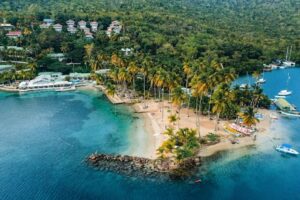
The program has four investment options and investors will have their applications processed and receive their approval letters within four to six months.
Investment options
- Non-refundable contribution to the Sustainable Island State Contribution (SISC): $250,000
- Real estate investment in shares approved projects or a condominium unit: $325,000
- Purchase of a single family private dwelling: $600,000
- Non refundable contribution to the Public Benefit Option: $250,000
What makes a St Kitts and Nevis passport attractive?
- Has the fastest application process, issuing passport in as little as four months
- Fast-growing economy with stable governance
- A long-standing reputation among foreign governments and global regulators
- Quality offshore banking and a range of insurance services
- No personal income tax to reduce tax obligations
- St Kitts and Nevis real estate citizenship allows applicants to purchase private homes
- The most visa free countries, with access to 155 destinations

Antigua and Barbuda: The best value for families
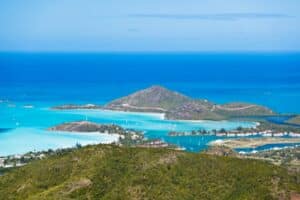
The application process to obtain an Antigua and Barbuda passport takes around six months and the investment program offers four investment routes.
Investment options
- Non-refundable contribution to the National Development Fund (NDF): $230,000
- Government-approved real estate investment: $300,000
- Donation to the University of West Indies Fund (UWI): $260,000
- Government-approved business investment: $400,000
What makes an Antigua and Barbuda passport attractive?
- Cheapest Caribbean citizenship program for families of four and larger families with six or more members
- Unlock visa free travel to 151 countries, including the UK and the European Union
- The UWI Fund option entitles one member of the family to a one-year, tuition-only scholarship at the University of the West Indies.
- Dual citizenship is recognized, and lifetime citizenship is protected
- Outstanding lifestyle in the tropics with year-round sunshine
Dominica: Four times named the best citizenship by investment program in the world

The investment threshold starts at $200,000 for single applicants and $250,000 for a family of up to four, and potential applicants have two options to invest in. It takes about six to nine months to complete the Dominica citizenship application process.
Investment options
- Non-refundable contribution to the Dominica Economic Diversification Fund (EDF): $200,000
- Government-approved real estate investment: $200,000
What makes a Dominica passport attractive?
- The state fund contribution to the Economic Diversification Fund makes Dominica’s program the cheapest route to Caribbean citizenship for single applicants.
- The $200,000 investment in pre-approved real estate projects is the most affordable real estate option among Caribbean programs.
- There are no stay requirements.
Grenada: A route to the USA
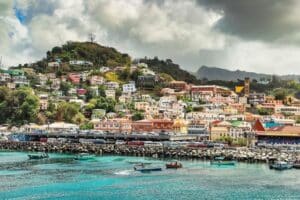
Investment Migration Authority Grenada is the country’s CBI Unit assigned to oversee the program. It takes about to six months to complete citizenship process and investors can choose one of two routes.
Investment options
- Non-refundable contribution to the National Transformation Fund (NTF): $235,000
- Government-approved real estate investment:
- Joint investment: $270,000
- Sole investment: $350,000
What makes a Grenada passport attractive?
- Grenada is the only Caribbean citizenship by investment program and country in the Caribbean region that holds an E-2 Visa Treaty with the USA.
- The principal applicant can include a spouse, dependent children, dependent parents and grandparents, unmarried siblings.
- There are no stay requirements.
St Lucia: Diverse investment options available
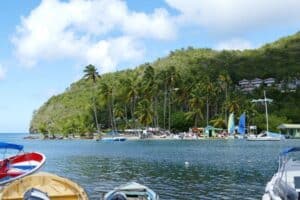
A sole investor or a main applicant and up to three financially dependent family members can acquire citizenship from $240,000 with the government fund option. The application process takes 10 to 12 months, and there are four investment routes, including St Lucia real estate citizenship.
Investment options
- Non-refundable contribution to the National Economic Fund (NEF): $240,000
- Government-approved real estate investment: $300,000
- Approved enterprise investment: $250,000
- Acquisition of National Action Government Bonds (NAB): $300,000
What makes a St Lucia passport attractive?
- The government bond option is the only fully refundable investment among the five Caribbean programs.
- There are several approved enterprise projects, comprising sole investments or joint investments.
- A donation of $240,000 to the National Economic Fund qualifies a single applicant or family of up to four.
- The principal applicant can apply for a St Lucia passport for their spouse, dependent children, dependent parents and grandparents, unmarried siblings.
Caribbean Citizenship by Investment Comparison Table
Caribbean citizenship by investment programs – sometimes referred to as Caribbean golden visa or economic citizenship programs – are very attractive and cost-effective, with minimum investment requirements and excellent visa-free travel and tax benefits.
These programs are only getting more popular, particularly among high-net-worth families and individuals, and it’s easy to see why. The investment route to Caribbean nationality enables you to live or own a second home in an exotic Caribbean nation in the West Indies while still earning income on the side. What’s not to like about that?
| Country | Investment Cost (Single Applicant) | Investment Cost (Family of Four) | Family Eligibility | Time until Citizenship | Visa-Free Travel Countries |
|---|---|---|---|---|---|
| $230,000 | $230,000 | Spouse, children, dependent parents, grandparents, and siblings | 6 months | 151 countries, including the EU, UK, Singapore, Hong Kong, Russia, China, and Qatar | |
| $240,000 | $240,000 | Spouse, children, dependent parents, and siblings | 10-12 months | 148 countries, including the EU, UK, Singapore, Hong Kong, and Taiwan | |
| $200,000 | $250,000 | Spouse, children, dependent parents, grandparents | 6-9 months | 135 countries, including Schegen countries, Singapore, Hong Kong, China, and Russia | |
| $250,000 | $250,000 | Spouse, children, and, dependent parents | 4-6 months | 154 countries, including the EU, UK, Singapore, Hong Kong, Russia, Taiwan, and Saudi Arabia | |
| $235,000 | $235,000 | Spouse, children, dependent parents, grandparents, and siblings | 6 months | 148 countries, including the EU, UK, Singapore, Hong Kong, China, Russia, and Saudi Arabia |
Estimated citizenship cost for a single applicant and family of four
Here is an example of the estimated Caribbean passport cost of each program for a single applicant and a family of four, including government fees. The example includes a primary applicant, spouse, and two children aged 8 and 17.
Single Applicant | |||||
Costs | Antigua and Barbuda | Dominica | Grenada | St Kitts and Nevis | St Lucia |
Investment Required | $230,000 | $200,000 | $235,000 | $250,000 | $240,000 |
Application/Processing Fee | $10,000 | $1,000 | $3,000 | $250 | $2,000 |
Due Diligence Fee | $8,500 | $7,500 | $7,500 | $10,000 | $8,000 |
Interview Fee | $1,500 | $1,000 | $1,000 | - | - |
Passport Fee | $300 | - | - | $350 | $500 |
Total | $250,300 | $209,500 | $246,500 | $260,600 | $250,500 |
Family of Four | |||||
Costs | Antigua and Barbuda | Dominica | Grenada | St Kitts and Nevis | St Lucia |
Investment Required | $230,000 | $250,000 | $235,000 | $250,000 | $240,000 |
Application/Processing Fee | $20,000 | $4,000 | $10,000 | $1,000 | $5,000 |
Due Diligence Fee | $15,500 | $15,500 | $22,500 | $25,000 | $18,000 |
Interview Fee | $4,500 | $3,000 | $3,000 | - | - |
Passport Fee | $1,200 | - | - | $1,400 | $2,000 |
Total | $271,200 | $272,500 | $270,500 | $277,400 | $265,000 |
Caribbean Citizenship by Real Estate Investment
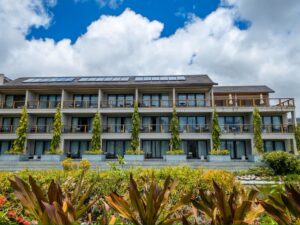
Eligibility for the real-estate route generally requires investors to agree to invest in government-approved real developer projects with a minimum purchase value. Real estate investments must be approved by the government, which generally comprise units or suites in tourism-focused real estate developments.
The real estate purchase contracts are signed upfront, but their validity is conditional upon the application’s approval, meaning the transfer of funds is not required until after the citizenship application has received pre-approval.
Here is an outline of the current investment thresholds to get citizenship by Caribbean real estate investment.
Antigua and Barbuda
- Real estate investment valued at least $300,000
Dominica
- Real estate investment valued at least $200,000
Grenada
- Joint real estate investment valued at least $270,000
- Sole real estate investment valued at least $350,000
St Kitts and Nevis
- Real estate shares or condominium unit investment valued at least $325,000
- Sole private home purchase valued at least $600,000
St Lucia
- Real estate investment valued at least $300,000
A uniform requirement to obtain and maintain citizenship in Dominica, Antigua and Barbuda, Grenada, and St Lucia is investment properties are subject to a minimum holding period of five years before they can be resold. However, St and Nevis requires investors to hold their properties for at least seven years.
What is a Caribbean Golden Passport?

These economic citizenship programs allow foreigners to invest in their economies through contributing to state investment funds or buying real estate and obtain a Golden Passport in return. The term “Golden Passport” refers to the benefits that come with it, especially increased global mobility and financial opportunities.
Key Caribbean Golden Visa benefits
Caribbean Golden Passports have become increasingly popular as they provide visa free or visa on arrival access to key destinations, including the Schengen Area, the UK, China, Russia, Singapore, and Hong Kong.
They also come with tax benefits as most Caribbean CBI countries do not tax global income, capital gains or inheritance. Additionally, investors can apply for citizenshi foor their family members under a single investment.
What is the cost of a Golden Passport?
If you’re wondering, “How much does a Caribbean Golden Passport cost? ” The required investment varies depending on the country, program, and investment route chosen. The cheapest way to obtain a Golden Passport in the Caribbean as a single applicant is through Dominica’s citizenship program, which requires a minimum investment of $200,000 and processing fees amounting to about $200,000.
Though St Kitts and Nevis offers the best Caribbean passport by investment, it is also the most expensive Golden Passport, requiring a total investment of over $260,000 for single applicants.
How to get a Caribbean passport?
You can obtain a Caribbean passport by birth, descent, marriage, naturalization or investment. The Caribbean passport by investment route requires foreign nationals to contribute to invest in a business, purchase approved property, or make a donation through a licensed agent like Global Citizen Solutions.
How you can qualify for a Caribbean passport depends on the citizenship by investment program you apply for, but generally speaking, all five Caribbean nations request the following:
- You must prove you have the capital to make the investment
- You must pass a detailed background check
- You must be in good health and have a good character
- You must make the qualifying investment and prove you’ve made it with the necessary paperwork
- You must swear an oath of allegiance
Caribbean Citizenship Application Process

- Choose your investment program: Decide which Caribbean country and investment program best aligns with your goals.
- Choose your investment route: Determine which investment route is most suitable for you and your financial objectives.
- Select an Authorized Agent: From the CIU’s list of approved Authorized Agents, choose one to submit your citizenship application.
- Complete all application forms: Complete all the forms and necessary documents as provided by your Authorized Agent.
- Submit your application: Your dedicated Investment Migration Specialist will submit the citizenship application on your behalf.
- Take the citizenship interview: As part of the citizenship process, you must complete the mandatory Caribbean citizenship interview requirement, which can be done virtually.
- Receive CIU approval of application: Within the country’s average processing time, you will receive a confirmation letter with the status ‘Approved in Principle.’
- Make your investment: Make the required investment and send proof to the CIU.
- Become a citizen: Take the oath or affirmation of allegiance in the country or at an Embassy, High Commission, or Consular Office overseas, and become a Caribbean citizen.
Caribbean Passport Power Comparison
When evaluating Caribbean citizenship programs, investors often encounter “Passport Power Rankings” from various global indexes, including the Global Citizen Solutions Global Passport Index. These rankings of countries and their passports are primarily based on their passports’ travel freedom, which is measured by visa free, visa on arrival, eVisa, and eTA access to foreign countries.
Should the number of visa free countries factor into your decision to invest in a Caribbean passport? This table outlines each Caribbean passport’s strength regarding Caribbean passport visa free countries.
Country | Visa Free Countries | GPI Ranking | Key Visa Free Destinations |
St Kitts and Nevis | 154 | 45th | Schengen Area, UK, Ireland, Russia, Taiwan, Singapore, Saudi Arabia |
Antigua and Barbuda | 151 | 51st | Schengen Area, UK, Ireland, Russia, China, Singapore, Qatar, South Africa |
St Lucia | 148 | 70th | Schengen Area, Singapore, UK, Ireland, Taiwan |
Grenada | 148 | 71st | Schengen Area, UK, Ireland, Russia, China, Singapore, Saudi Arabia |
Dominica | 135 | 76th | Schengen Area, Russia, China, Singapore, Thailand |
Though all five Caribbean Golden Passports provide significant visa free travel privileges, the Barbados passport currently holds the top spot among Caribbean passports in Global Passport Indexes, offering to the highest number of visa free destinations, including major economies like Canada, the UK, the EU, Japan, and the UAE.
Pros and Cons of Each Caribbean Citizenship Program
Antigua and Barbuda
Pros
- Cheapest Caribbean citizenship for larger families of six or more members.
- Only Caribbean citizenship program offering educational benefits through the UWI Fund option.
Cons
- Only Caribbean country with a minimum residency requirement.
- Relatively expensive for single applicants.
Dominica
Pros
- Cheapest country for single applicants to invest in the Caribbean and obtain citizenship.
- Cheapest country for citizenship by real estate investment.
Cons
- Only Caribbean country without access visa free to the UK and Ireland.
- Dependent siblings are not eligible.
Grenada
Pros
- Only Caribbean country whose citizens qualify as US E-2 Treaty Investors.
- Extensive family inclusion allows spouses, children, parents, grandparents, and siblings to obtain citizenship.
Cons
- Limited investment options.
- Taxes worldwide income and imposes the highest corporation tax, at a flat rate of 28 percent.
St Kitts and Nevis
Pros
- Strongest Caribbean passport, with visa free access to 154 destinations, including the UK, Russia, EU countries, Taiwan, Singapore, and Saudi Arabia.
- Shortest Caribbean citizenship timeline, with passports issued within four to six months.
Cons
- Most expensive program for single applicants and families.
- Grandparents and siblings are not qualified dependents
St Lucia
Pros
- Only Caribbean country offering a fully guaranteed and refundable investment option through the government fund route.
- Four investment routes, including the option to establish a business.
Cons
- Longest citizenship timeline, with an average processing time of 10 to 12 months.
- No visa free access to China or Russia.
What are common misconceptions about Caribbean citizenship by investment programs?
Some common misconceptions about Caribbean investment citizenship programs include the following:
1. Investors can submit independent citizenship by investment applications
Immigration authorities require all applications for Caribbean CBI programs to be submitted through a licensed Authorized Agent to streamline application selection and guarantee that only the most qualified candidates advance.
2. Successful applicants must reside in the country to obtain Caribbean citizenship
The dual citizenship process for Caribbean citizenship by investment programs is entirely remote. There are no residency requirements to qualify for Caribbean citizenship.
3. Caribbean CBI programs lack security
Caribbean governments offering citizenship by investment take security seriously. They continuously implement measures aligning with international law and requirements from governing bodies like the US Treasury and OECD to ensure the safety of their
citizens and maintain their program’s integrity. This is proven by the recent signing of the Caribbean Citizenship Memorandum of Understanding between the leaders of the countries offering the five Caribbean citizenship programs.
4. Citizenship by investment in the Caribbean is exclusively designed for wealthy individuals
Caribbean nations provide investment programs designed to attract foreign nationals with varying financial backgrounds. These programs offer routes such as property investment, with the option to earn rental income, and government bond acquisition, which is refundable after five years.
5. You obtain Caribbean ethnicity
There is no singular Caribbean race, ethnicity, or nationality. Upon acquiring citizenship in one of the Caribbean islands, individuals gain the nationality of a specific Caribbean country.
Why use Global Citizen Solutions?
Global Citizen Solutions is a multidisciplinary firm offering bespoke residence and citizenship solutions in Europe and the Caribbean. In a world where the economy and politics are unpredictable, having a second citizenship opens up opportunities and creates flexibility for you and your family.
So, why work with Global Citizen Solutions to obtain Caribbean citizenship?
- Global approach by local experts: We are corporate members of the Investment Migration Council, with local expertise in all five Caribbean CBI programs.
- 100 percent approval rate: We have never had a case rejected and will offer you an initial, free-of-charge, due diligence assessment before signing any contract.
- Independent service and full transparency: We will present to you all the investment options available, and all expenses will be discussed in advance, with no hidden fees.
- An all-encompassing solution: A multidisciplinary team of immigration lawyers, investment specialists, and tax experts will take into consideration all your and your family's mobility, tax, and lifestyle needs.
- Confidential service and secure data management: All private data is stored within a GDPR-compliant database on a secure SSL-encrypted server.

Don’t forget to check our other Caribbean comparison articles:
- St Lucia vs Dominica Citizenship
- St Kitts and Nevis vs Dominica Passport
- Grenada vs St Kitts Citizenship
- Grenada vs St Lucia Citizenship
- St Kitts vs St Lucia Citizenship
- Grenada vs Dominica Citizenship
- Antigua vs St Lucia Citizenship
- Antigua vs St Kitts Citizenship
- Antigua vs Dominica Citizenship
- Antigua vs Grenada Citizenship
Frequently Asked Questions About Caribbean Citizenship Programs
What is the best Caribbean citizenship to acquire in 2025?
While the best Caribbean countries offering citizenship by investment depend on your individual needs and objectives, generally speaking, Dominica offers the best citizenship program in terms of its low investment threshold, whereas St Kitts and Nevis have the fastest citizenship timeline to a passport.
St Lucia vs Dominica passport: Which is better?
When comparing the merits of a St Lucia vs Dominica passport, St Lucia ranks 70th in the Global Passport Index, whereas Dominica ranks 76th. Both Caribbean passports provide improved visa free access. A Dominica Caribbean passport holder, however, can also travel visa free to China and Russia, whereas St Lucia passport holders have visa free access to the UK and Ireland.
St Kitts and Nevis vs Dominica passport: Which is better?
When comparing the St Kitts and Nevis passport vs Dominica passport, the St Kitts citizenship cost is more expensive than Dominica’s passport program. However, St Kitts and Nevis’s passport offers more visa free countries, with 154 vs 135 with the Dominica passport.
Which country gives the fastest citizenship by investment?
The St Kitts and Nevis citizenship program issues the fastest Caribbean passport by investment. Obtaining citizenship through this Caribbean CBI program takes four to six months, provided the principal applicant fulfills the investment and citizenship applications and due diligence process without inconsistencies.
What Caribbean citizenship by investment countries exist?
At present, the Caribbean nations that have citizenship by investment programs are St Lucia, Antigua and Barbuda, Grenada, Dominica, and St Kitts and Nevis.
What’s the best Caribbean passport in terms of global ranking?
The St Kitts and Nevis passport ranks 45th in mobility in the Global Passport Index, the highest position of the five citizenship by investment programs in the Caribbean.
What is the easiest Caribbean island to get citizenship in 2025?
The primary requirements of the five Caribbean citizenship by investment programs are to be over 18, have a clean criminal record, and make a qualifying investment in the country. Antigua and Barbuda and St Kitts and Nevis are among the easiest countries in the Caribbean to get citizenship due to straightforward application processes, low investment requirements, and a fast processing time of four to six months.
Is there a Caribbean passport ranking for 2022?
According to the CBI Index report of 2022, Dominica and St Kitts and Nevis shared the first position as the Best CBI programs of the year. Right after them are St Lucia, Grenada, and Antigua and Barbuda.
Are there any variations in the application process or requirements among the Caribbean programs?
When applying for a Caribbean passport by investment, regardless of the program, applicants must invest in an approved property or enterprise or donate to a government fund via an Authorized Agent. Applicants must have their Authorized Agent submit their application on their behalf. As part of their due diligence processes, Dominica, Grenada, and St Kitts and Nevis require the main applicants and dependents (16 and older for Dominica and St Kitts, 17 and older for Grenada) to partake in mandatory interviews.
Can I maintain dual citizenship if I acquire Caribbean citizenship through investment?
All Caribbean countries offering a CBI program recognize dual citizenship. Applicants do not need to give up their first citizenship to obtain Caribbean nationality and a Caribbean passport. However, this hinges on the original country of citizenship allowing second citizenship.
What is the Caribbean passport price?
The cost of a Caribbean passport depends on the CBI program and the investment option. A single applicant to Dominica’s program will pay less than $210,000 when donating to the Economic Diversification Fund, whereas a family of six or more must contribute at least $260,000 to Antigua and Barbuda’s University of the West Indies Fund. The minimum Caribbean passport cost in Grenada is $235,000.
How much to invest in the Caribbean to get citizenship?
The minimum investment threshold to get Caribbean citizenship is $200,000 to $250,000 and $230,000 to $250,000 for a family of four. These thresholds apply to non-refundable donations to a government fund. The Caribbean real estate investment option has a minimum purchase value of $200,000 to $325,000. The minimum investment requirement excludes government, application, and due diligence fees.
How much does it cost to invest in Barbados citizenship?
Barbados doesn’t operate a Caribbean citizenship by investment program, but foreign nationals can contribute $2 million to the Bajan economy through investments such as bank deposits or Caribbean real estate investments and obtain permanent residency. After five years of continuous residency, they can apply for Barbados citizenship by naturalization.

 Joe Rice
Joe Rice  Favorable tax environment: No worldwide income taxes, including wealth, inheritance, gift, and capital gains tax.
Favorable tax environment: No worldwide income taxes, including wealth, inheritance, gift, and capital gains tax.
